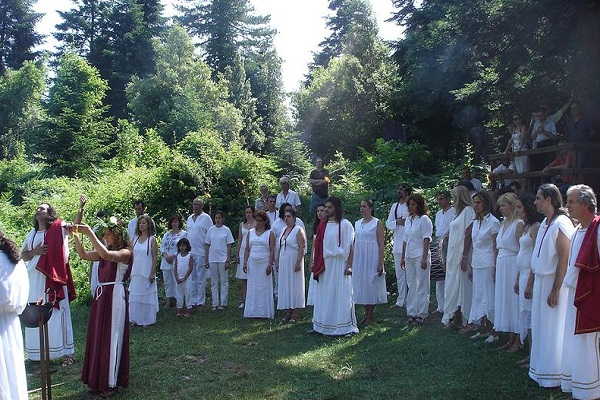
Hellenism Officially Recognized as a Religion in Greece
- By C Barnett --
- 20 Apr 2017 --
![Hellen ritual performed by members of the YSEE, Supreme Council of Ethnikoi Hellenes. YSEE, Supreme Council of Ethnikoi Hellenes. [CC BY 2.0], via Wikimedia Commons](http://www.worldreligionnews.com/wp-content/uploads/2017/04/800px-Hellen_ritual_2.jpg)
YSEE, Supreme Council of Ethnikoi Hellenes. [CC BY 2.0], via Wikimedia Commons
The ancient religion Hellenism is now a ‘known religion’ in Greece.
Hellenism is now listed as an official religion in Greece.[/tweetit] Prior to the granting of this legal status by Greece’s government, Hellenistic practices had no legal standing in the country and adherents could not build its houses of worship or carry out its ceremonies legally. The Supreme Council of Ethnic Hellenes announced the decision by the government on the April 9, much to the joy of the practitioners of the ancient faith.
Hellenism Officially Recognized as a Religion in Greece[/tweetthis]
This is only the first step towards complete recognition, the Supreme Council revealed. The faith is now only counted as one of the “known religions” and is yet to be recognized as a statutory body by Greece. The Supreme Council has announced it would continue fighting for its recognition by the Greek government, and will even knock on the doors of the European Court of Human Rights if needed.
Religious life in Greece is governed by the Organization of the Legal Forms of Religious Communities and their Organizations in Greece, which officially recognizes only six religions apart from the Greek Orthodox faith. Islam is still struggling to gain a strong footing in the country, and is still not allowed to build mosques.
The appeal for recognition of the Ethnic Hellenistic religion was rejected in 2015, although it has existed in Greece for a longer time preceding Christianity. Despite a full-forced persecution by the Christians, the faith has survived into modern times, and is finally seeing its efforts for survival paying off. The faith is not centralized, and focuses on personal experiences with the gods. As such, there is no governing body or fixed rules. Hellenistic practices are found all over the world, each group following its own rituals and practices. In general, religious ceremonies include purificatory rituals, prayers and invocations, ritual sacrifice, and feasting in honor of the gods. The Hellenistic pantheon includes Zeus, Hera, Apollo, Artemis, Athena, Poseidon and so on – members of the Olympian family.
Hellenism is different from other pagan ways of life, such as Wicca, which is very similar in structure to Christianity. Unlike Hellenism, Wicca, often confused with Hellenism, has a centralized clergy system, core beliefs and a central sacred text.



















